#haunani Kay trask
Text
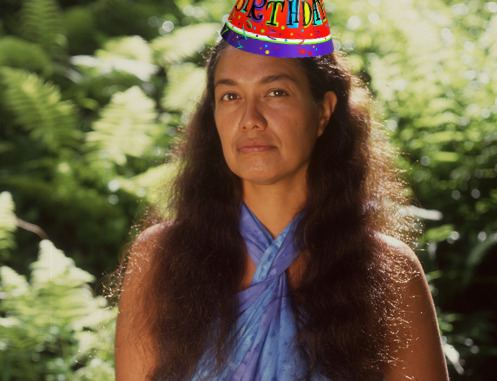
Happy birthday, Haunani-Kay Trask! (October 3, 1949)
A leading figure in the movement for Hawaiian independence, Haunani-Kay Trask was born in San Francisco before her family moved to O'ahu. She pursued an academic career, earning her PhD in political science in 1981. A Native Hawaiian, Trask founded the Kamakakūokalani Center for Hawaiian Studies at the University of Hawaiʻi at Mānoa, and heavily promoted and pioneered Hawaiian Studies as a discipline. Politically, Trask identified with left-wing currents, protesting against the Vietnam War and supporting the Black Panther Party. She utilized feminist theory, although she criticized mainstream American feminism as overly focused on white womanhood, and opposed the US military's presence in Hawaii while also opposing tourism to the islands. She was also opposed to efforts to group Native Hawaiians together legally with Native American tribes, and any efforts to further erode Hawaiian sovereignty. Her book From a Native Daughter: Colonialism and Sovereignty in Hawaiʻi is considered to be a seminal work of anti-colonial literature. Trask continued her advocacy and work until her death in 2021.
"Our story remains unwritten. It rests within the culture, which is inseparable from the land. To know this is to know our history. To write this is to write of the land and the people who are born from her."
290 notes
·
View notes
Text
youtube
Haunani Kay Trask speech, Jan 17, 1993
"We are not American! We will die as Hawaiians, we will never be American! ... Fight!"
Full speech, which is even more intense: https://www.youtube.com/watch?v=RwWNigoZ5ro
8 notes
·
View notes
Text
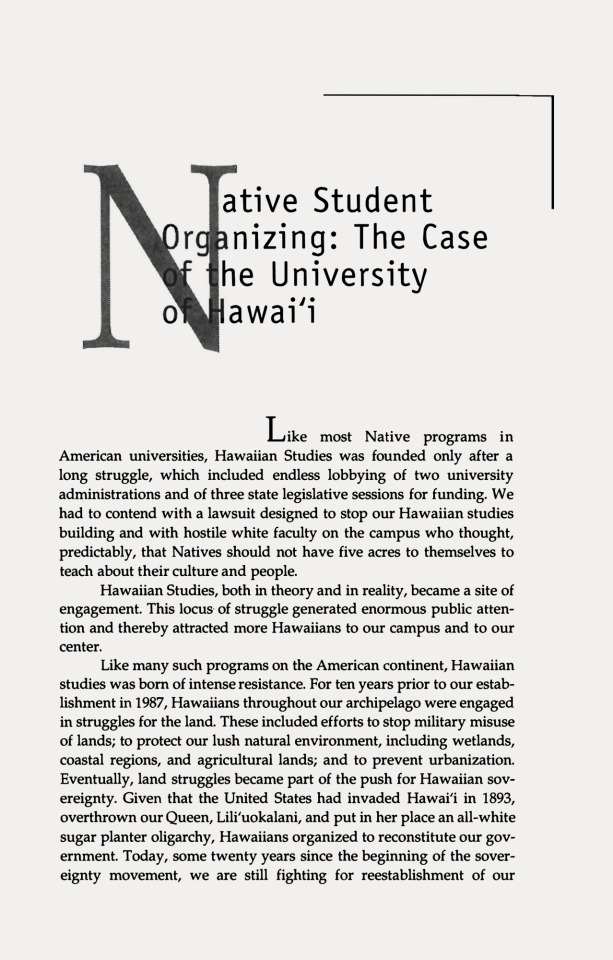
Haunani-Kay Trask, (1993), Native Student Organizing: The Case of the University of Hawai'i, in From a Native Daughter. Colonialism and Sovereignty in Hawai'i, University of Hawai'i Press, Honolulu, in association with the Kamakakūokalani Center for Hawaiian Studies, University of Hawai'i at Manoa, 1999, Revised edition, pp. 185-192
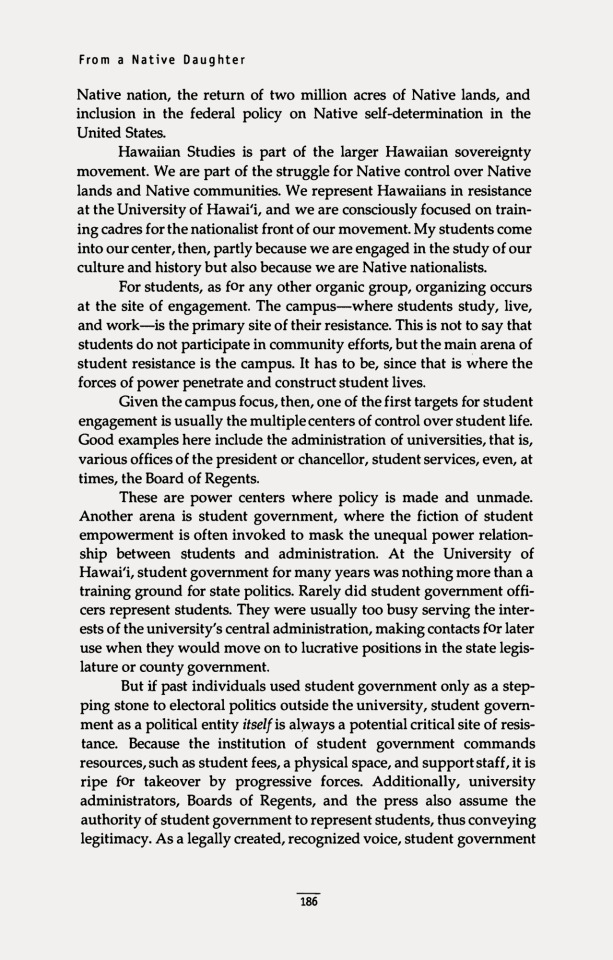

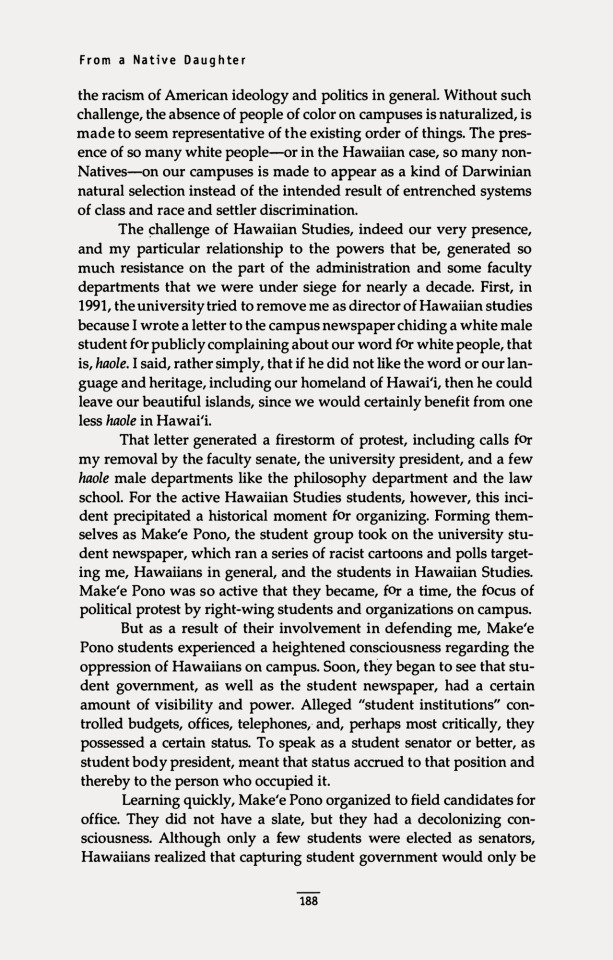




#graphic design#book#haunani kay trask#honolulu university of hawai'i press#kamakakūokalani center for hawaiian studies#1990s
25 notes
·
View notes
Text
HONOR ONE OF HAWAI`IʻS GREAT PATRIOTS THIS SATURDAY

Women's History Month
Saturday, March 16th
Poetry & Mo`olelo by & for Haunani-Kay Trask
Come join us for an evening of poetry and storytelling celebrating the life and work of Haunani-Kay Trask!
Reservations Here - TinyURL.com/WeAreNotAmerican
6 notes
·
View notes
Text
DR. HAUNANI-KAY TRASK // SCHOLAR
“She was a feminist scholar and poet who spent her life advocating for sovereignty for Hawaii’s indigenous peoples. She was a supporter of the Black Panther Party, and was active in the anti-Vietnam war struggle. She earned her doctorate in political science in 1981. She was a founding member of Ka Lahui Hawai’i, an organisation that champions Hawaiian self-determination. In 1993, she led 15,000 Native Hawaiians in a march to reclaim Indigenous lands held by the the US government. She was also a tenured professor at the University of Hawai’i. She is credited with co-founding the contemporary field of Hawaiian studies, and went on to become the founding director of Kamakakūokalani Center for Hawaiian Studies at UH Mānoa. Her legacy continues to live on in the fight for Indigenous self-determination.”

3 notes
·
View notes
Text
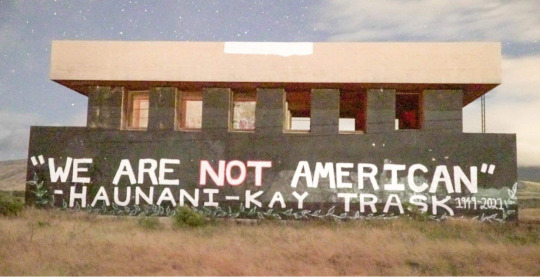
3 notes
·
View notes
Text
When historians wrote that the [Hawaiian] king owned the land and the common people were bound to it, they were saying that ownership was the only way human beings in their world could relate to the land, and in that relationship, some one person had to control both the land and the interaction between humans.
And when they said that our chiefs were despotic, they were telling of their own society, where hierarchy always resulted in domination. Thus, any authority or elder was automatically suspected of tyranny.
And when they wrote that Hawaiians were lazy, they meant that work must be continuous and ever a burden.
And when they wrote that we were promiscuous, they meant that lovemaking in the Christian West was a sin.
And when they wrote that we were racist because we preferred our own ways to theirs, they meant that their culture needed to dominate other cultures.
And when they wrote that we were superstitious, believing in the mana of nature and people, they meant that the West has long since lost a deep spiritual and cultural relationship to the earth.
And when they wrote that Hawaiians were ‘primitive’ in their grief over the passing of loved ones, they meant that the West grieves for the living who do not walk among their ancestors.
Haunani Kay-Trask, From a Native Daughter, p. 117-118
326 notes
·
View notes
Text
me: hotels are money hungry corporations that don’t care about native hawaiians
people who refuse to do a cursory google search: source?
#like brooooo do you even know how many hotels are on this island#the Hawaiian Renaissance didn’t happen for y’all to give hotels built on burial grounds the benefit of the doubt#ooc; hand over the gender#say what you want about haunani Kay trask but if she were still here she would be on NECKS#bissen and green would be pissing themselves and so would the entirety of wailea
5 notes
·
View notes
Text

1 note
·
View note
Text
If you are talking about the human tragedy and climate disaster impacting Hawai’i ONLY in relation to tourism or your (postponed) vacation plans . . . therein lies the problem.
Hawai'i is not an "eat, pray, love" trip nor is she a cultural theme park.
Hawai’i is a collection of communities with deep indigenous roots and ancestral identities (many queer + colorful) that American + European colonizers once attempted to eradicate.
In the present day, empire-builders and colorblind colonizers are attempting to gentrify and commodify these ancestral spaces, not to benefit the indigenous, diaspora, and immigrant folks (folx) who steward and preserve those waterways and lands, but to protect the interests and properties of billionaires on vacation
Afronaut Note: This is not a discussion about policing language or shaming folks in your neighborhood who are sharing vacation pictures or lamenting their travel plans. This is about expanding our horizons to center decolonized, ancestral, and communal spaces. Imagine if after the Japanese tsunami (2011) or Hurricane Katrina (2005), people shared vacation pictures and complained about having to cancel their graduation trips.
Original post from @seedingsovereignty
——
"Our culture has to be the core of our mana." Dr. Haunani-Kay Trask (1949 – 2021)
A leader of the Hawaiian sovereignty movement & a fearless leader.
Her memory is needed during these times.
Support the People of Hawai’i
#we are not americans#indigenous rights#Flowers for Hawai’i#our world#ecosystem of white supremacy#slow growth activism#our history is your history
1K notes
·
View notes
Text
today marks one year since the deadly wildfires in lāhainā, maui. while these have been labelled as the deadliest wildfires in the “united states” in the last century, please remember on this day that Hawai’i is illegally occupied by the usa and tragedies like lāhainā’s fires are intricately connected to the legacy of colonisation here in ke aupuni Hawai’i.
for further research i will always recommend from a native daughter by haunani kay trask and act of war: the overthrow of the hawaiian nation as starting points. @/ainamomona on instagram is another great resource for contemporary issues. if you want to dig deeper id be happy to recommend more from my personal collection.
e ola ka lāhui Hawai’i! mālama mau lāhainā
21 notes
·
View notes
Note
hello. I think you have a great blog and amazing tastes and I was wondering if you had any book recommendations? fiction or non-fiction, though I tend to read more fiction. I'm afraid I do not read enough books that were written outside North America/Europe and I would love to change that. anyway, sorry for the disturbance, I hope you are well <3
hi dear anon, i hope you're well too <3 im so sorry this has been sitting in my inbox forever! i hope you see it. thank u for ur kind words, i'm happy to share some recs! they'll be a mix of authors from north america/europe as well as outside those regions, and most will be writers of color bc that's who I tend to look for and read, i also gravitate towards fiction but ill try to do both. * = i've read it and would definitely recommend, and the rest are on my tbr that ive heard good things about and/or really want to get to myself.
I would also look out for presses that publish specifically translations and non-Western stories - two lines press, europa, transit books, open books, greywolf press - and you can look to who they're interacting w as well to expand your search for these kinds of books. happy reading <3
fiction:
vagabonds! by eloghosa osunde*
annie john by jamaica kincaid*
if an egyptian cannot speak english by noor naga*
the remainder by alia trabucco zerán, trans. sophie hughes*
sula by toni morrison*
scattered all over the earth by yoko tawada, trans. margaret mitsutani*
the thirty names of night by zeyn joukhader*
a passage north by anuk arudpragasam*
the hour of the star by clarice lispector*
an unkindness of ghosts by rivers solomon*
the umbrella country by bino a. realuyo*
the unpassing by chia-chia lin*
aquarium by david vann*
bright by duanwad pimwana, trans. mui pooposakul
hostages of memory by haitham hussein, trans. jona fras
mother of 1084 by mahasweta devi, trans. samik bandyopadhyay
on a woman's madness by astrid h. roemer, trans. lucy scott
the wild hunt by emma seckel
ornamental by juan cárdenas, trans. lizzie davis
i stared at the night of the city by bakhtiyar ali, trans. kareem abdulrahman*
men in the sun, and other palestinian stories by ghassan kanafani (various translators)*
funny boy by shyam selvadurai
violets by kyung-sook shin, trans. anton hur
afterparties by anthony veasna so
nonfiction:
a map to the door of no return by dionne brand*
out of the sun: on race and storytelling by esi edugyan*
uncommon measure: a journey through music, performance, and the science of time by natalie hodges*
from a native daughter: colonialism and sovereignty in hawai'i by haunani-kay trask
braiding sweetgrass: indigenous wisdom, scientific knowledge, and the teachings of plants by robin wall kimmerer
care work: dreaming disability justice by leah lakshmi piepzina-samarasinha
don't forget us here: lost and found at guantanamo by mansoor adayfi
the jakarta method: washington's anticommunist crusade and the mass murder program that shaped our world by vincent bevins
a still life: a memoir by josie george
7 notes
·
View notes
Text
"[Struggle] with our men occurs laterally, across and within our movement. It does not occur vertically between white women and indigenous women on one side and white men and indigenous men on the opposing side." - Haunani-Kay Trask
"There is no sisterhood. How can there be, when white supremacy has done such a thorough job of setting White Womanhood apart from the rest of us?" - Ruby Hamad
"Playing "but white women are powerless too, let's be powerless together" has no appeal, nor indeed meaning, for most [Native] women.” - Melissa Lucashenko
"White people set the standard for humanity by which they, and only they, could succeed. And this standard meant a strict hierarchy that placed white men at the top with white women just below them, followed by men of colour, and then women of colour occupying the lowest rung." - Ruby Hamad
"What you call patriarchy, I call one aspect of colonisation: for all their commonalities, for all your hoping and wishing it, our oppressions are not interchangeable." - Melissa Lucashenko
"[Despite] the general diversity of opinions in Aboriginal society, the strong stance that Aboriginal women take against the white women's movement remains universal." - Haunani-Kay Trask
"From the beginnings of settler-colonial societies, race was gendered and gender was raced. Only white men were Man and only white women were Woman. For hundreds of years, excluding women of colour from womanhood has been key to maintaining this racial hierarchy, and white women have been both privileged and subordinated by it." - Ruby Hamad
#thoughts#this is largely for personal reference but I got it all from Caelan Conrad’s video ‘Gender Critical: Fascism’ if you want to check it out
13 notes
·
View notes
Text

Haunani-Kay Trask, (1993), From a Native Daughter, in From a Native Daughter. Colonialism and Sovereignty in Hawai'i, University of Hawai'i Press, Honolulu, in association with the Kamakakūokalani Center for Hawaiian Studies, University of Hawai'i at Manoa, 1999, Revised edition, pp. 113-122
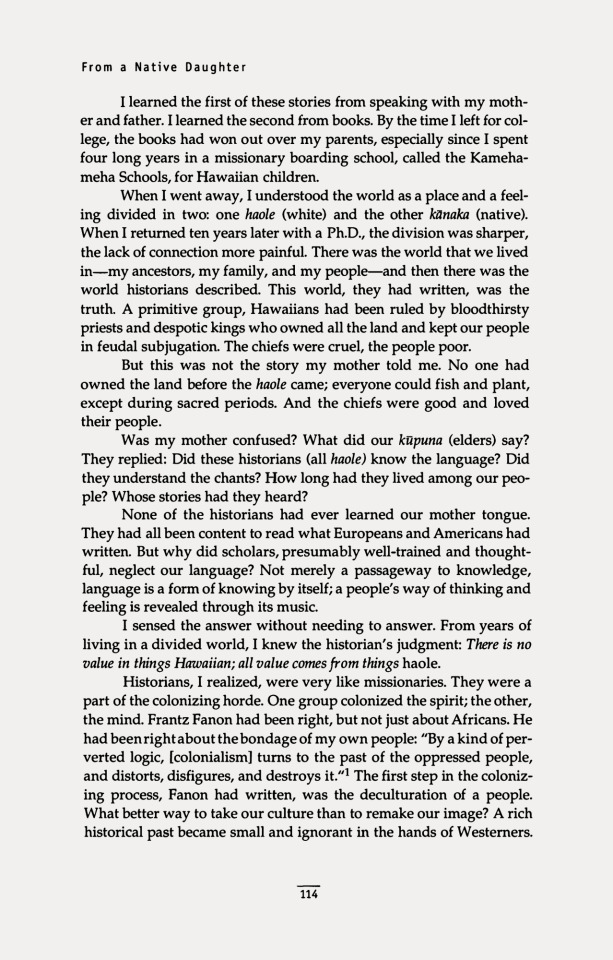

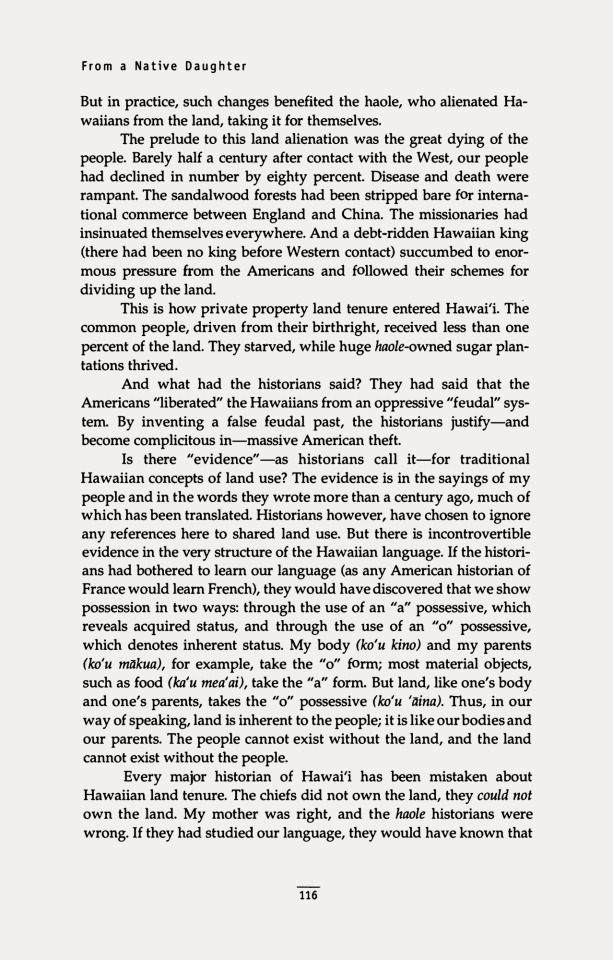
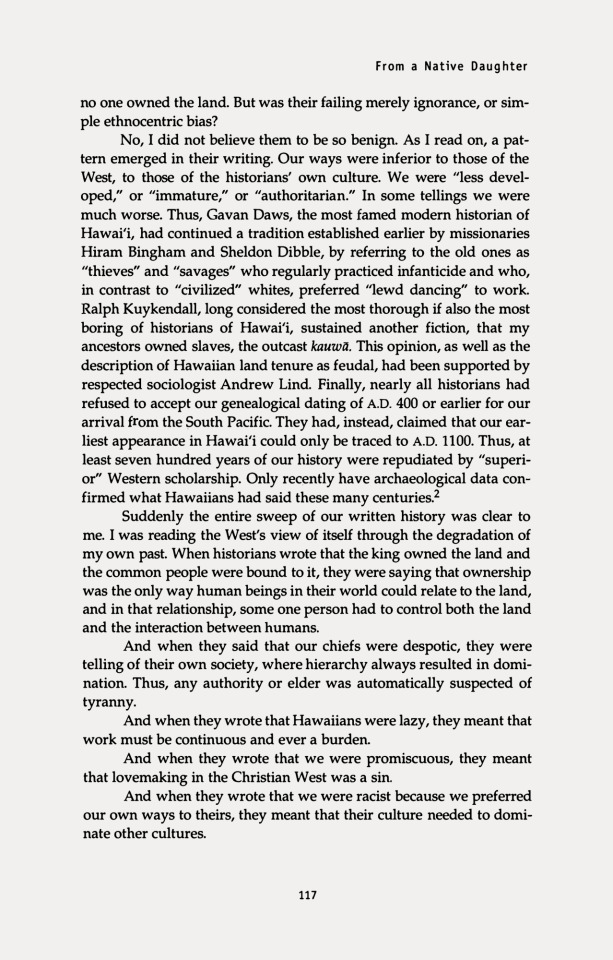

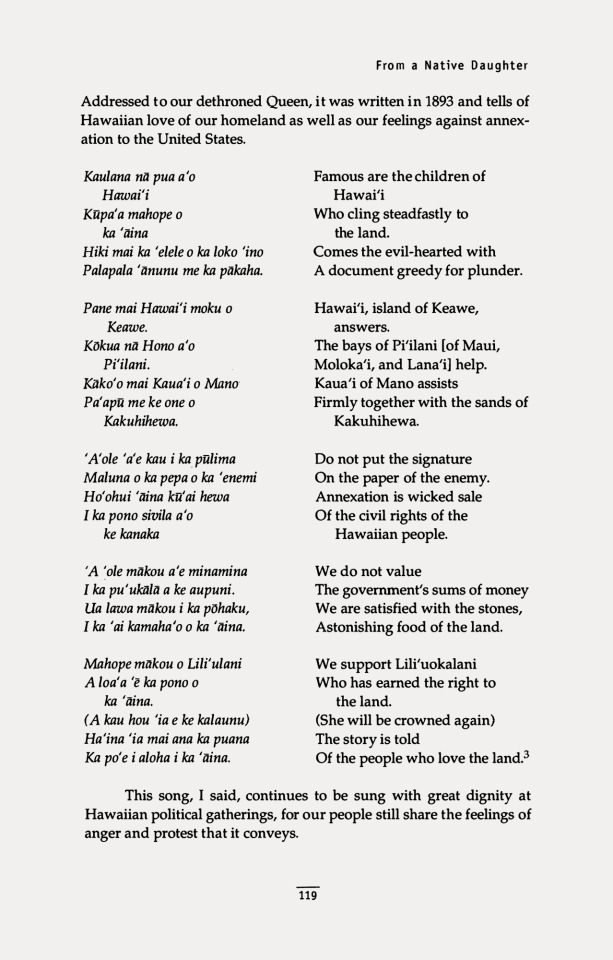

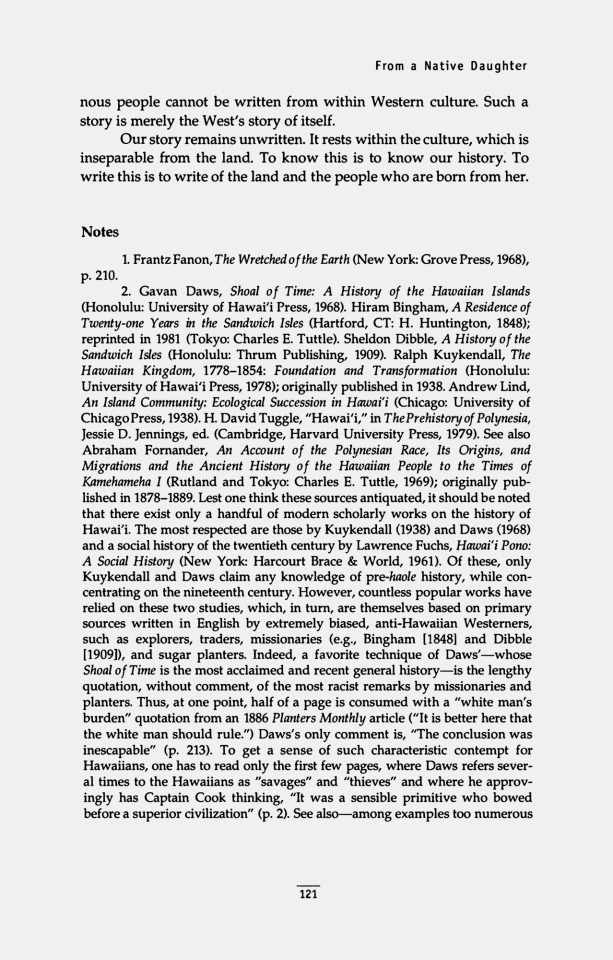
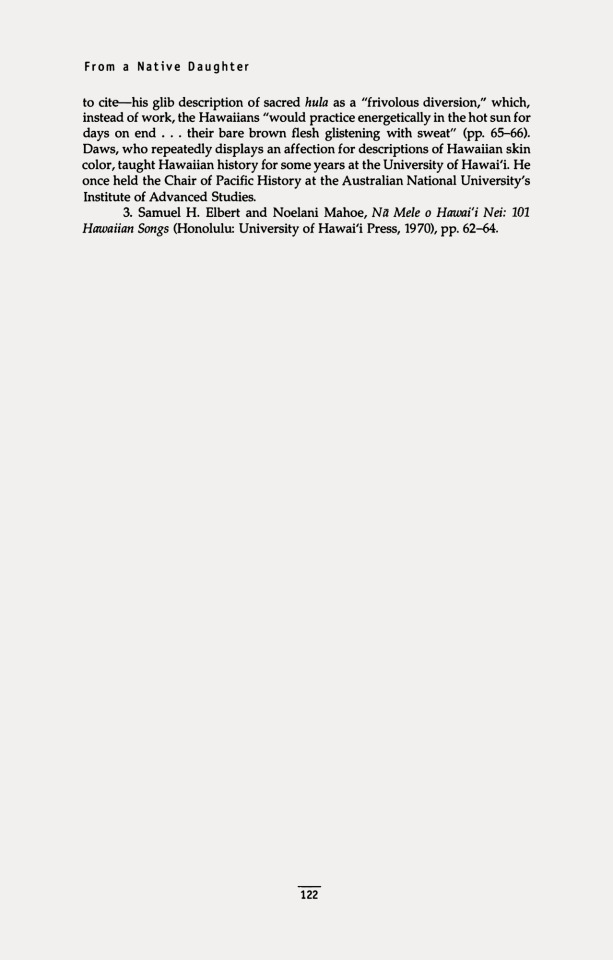
#graphic design#book#haunani kay trask#honolulu university of hawai'i press#kamakakūokalani center for hawaiian studies#1990s
15 notes
·
View notes
Text
DONʻT MISS IT - THIS COMING SATURDAY

Women's History Month
Saturday, March 16
Poetry & Mo`olelo by & for Haunani-Kay Trask
Come join us for an evening of poetry and storytelling celebrating the life and work of Haunani-Kay Trask!
Reservations Here - TinyURL.com/WeAreNotAmerican
4 notes
·
View notes
Text
I just read an article called "can culture be copyrighted", and boy howdie do anthropologists hate the idea of indigenous people being stewards of their own cultures.
Like the article definitely for sure says some pretty inch-resting stuff about like... intellectual property and the issues with that but overall it's an article about why it's bad that indigenous people are asking for cultural concepts of theirs to be closed off and how that goes against "liberal democratic" concepts of freedom to information.
He quotes Haunani-Kay Trast describing anthropologists and historians domination of the representation of indigenous cultures and then says: "Trask evidently hopes that indigenous peoples will eventually achieve exclusive power to represent themselves to the world at large. If realized, this vision would impound knowledge in a new reservation system: reservations of the written word, an apartheid of the mind", which is an insane take but one not really surprising from the Liberal anthropologist of the 90s (or even that of today).
Like if this was talking solely about how intellectual property and copyright laws are bad to concepts to apply to culture I'd be less critical but it's primarily a menagerie of arguments about why indigenous people need to work with their settlers within their settlers legal systems and institutions to compromise which is... again an insane take
#lillypad.txt#i had to read this for a uni class lol#i'm hoping this is more to critically analyse it rather than as an uncritical 'wow so true'
29 notes
·
View notes